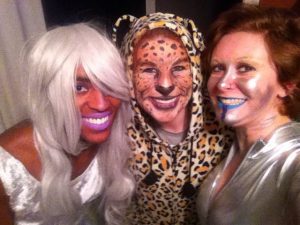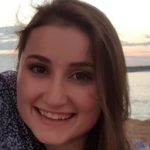This is an epic. It’s not about dragons or cyborgs or space or zombies. This is an epic about how seeing humans through a camera lens helped me to focus less on defining myself, and more on acceptance and living in the moment.
I was born three months early–in March, in a snowstorm, in Georgia. At one pound, 10 ounces, I could literally fit in the palm of my mother’s hand, I had to be in the NICU for three months, and I have a scar on my right arm from where a nurse accidentally stuck a needle through it while trying to locate a vein. The hole in my fragile frame eventually healed, becoming a neat little scar. My story wasn’t as well known as Harry Potter’s, so I fielded questions about my scar for a while.
I went through physical therapy to help my coordination and to get my knees to turn outward instead of buckling in. I also worked on steadying my perpetually trembling hands, which now only shake when I’m nervous or exhausted. Through elementary school, this became my focus: “I was born three months early,” I’d say whenever someone asked me about my scar. And then I’d launch into my spiel, to explain my slow hand-writing, my scar, my shaking, my soft-spoken voice on our school’s morning news show. I had the explanation down, I’d rehashed it so many times.
That was who I was as a person.
In middle school, that didn’t matter. Much to my relief, the questions about my scar subsided. I still got the occasional question, but people had more pressing matters–crushes, popularity, locker combinations–which suited me just fine. I was getting acclimated to a new group of friends, running for Jr. Beta Club president, and desperately trying to see past Dolores Umbridge’s deplorable character so I could finish reading Order of the Phoenix. I was elected president, finished HP5, and took to hanging out in the library with my friends: we wrote, read voraciously, and prepared for many a band concert there.
Finally, I had found my squad: the misfits of our respective elementary schools, we united in our eschewing of “tween social normalcy” and our love for supernatural creatures and stories. Through middle school, this became my focus: I was smart and different and by gosh, I would own it. Everyone in elementary school who teased me for being an “Oreo” couldn’t bother me any longer. I had found my group, and we could handle anything.
Enter high school, where I joined marching band and took up lacrosse. My friend group was put to the test, which we survived mostly intact. As high school progressed, AP classes, band, lacrosse, and magazine staff took up a majority of my time. My friends and I still hung out, of course, but it was on a less frequent basis than Disney Channel had led me to believe in my younger years. I traveled to Washington, DC in my freshman and junior years for Close-Up and the National Scholastic Press Association (politics and journalism, respectively). The summer before my senior year, I participated in two more journalism conferences in Fairfax, VA and Atlanta, GA. By the start of my senior year, I knew that I wanted to study journalism in college. That was my focus: I was a writer, and I would continue to hone my craft.
After I’d decided on UGA as my school of choice and journalism as my first major, my first two years of college were spent reveling in the anonymity of huge dorms, packed lecture halls, deafening football games, and shared indecisiveness regarding majors. I made four-year plans with wildlife science, public relations, English, and every certificate possible in hopes of finding the perfect match for journalism and thus, crafting my perfect four years. When I was paralyzed by all the choices, I’d give up and resume my reading or turn to Netflix’s comforting pit of non-motivation.
I was perfectly happy with my Greek mythology and astronomy classes, and saw no pressing need to declare a second major that would rob me of becoming a well-rounded individual.
My real worries began once I was accepted into Grady. I’d always known that I wanted to pursue journalism, but Grady presented a plethora of great options. On a whim, I signed up for Intro to Photojournalism. It was awkward, initially, as I fumbled first with the camera and then with the idea of approaching people I’ve never met and taking their picture (internal turmoil raged). My introverted nature almost wouldn’t let me continue the emphasis; then I switched my focus. Rather than dwelling on how uncomfortable this made me, I chose to focus on telling stories. This meant letting the camera disappear in my hand (as our professor would say), and letting myself disappear into the background. This became my focus: disappearing. It also helps that I’m a short, non-threatening person at 5 foot, 2 inches. Makes it relatively easy to go unnoticed as a photographer.
In order to get the camera to disappear in your hands, you had to shoot—constantly. The camera had to be glued to your hand. Before long, I noticed my images improving tremendously. I was noticing light quality, seeing more shadow, finding leading lines. The first assignment I really felt this click was a portrait using ambient light. I chose to photograph one of the managers at Bizarro-Wuxtry comics shop, and through multiple photography sessions in the store and outside, I ended with my first photo shoot product I was proud of.

As the semesters flew by, I grew more comfortable with the camera. Once I’d focused on getting all my images, I’d approach the people, make them feel at ease (even though I was all butterflies inside) and launch into my spiel about who I was and why I was photographing them. Most people were amazingly generous in sharing their experiences, and those positive responses lowered the anxieties I felt when bringing the camera to my eye.
People wanted their stories told, and I was incredibly lucky to be able to share them.
By now, you’ve no doubt noticed that I’ve only focused on the big phases. I didn’t tell you how many hours were spent driving to photojournalism workshops and editing in the darkened PhotoCave. You don’t know that the PhotoCave was my second home or how my pride swelled when I received my first compliment from my professor. I left off that I’m a climber and that at one point I was at the climbing wall three times a week, every week, during the semester. I didn’t focus on the fact that books and video games are amazing escapes that I love to get lost in, and even though I’m horrible at First Person Shooters, the Halo franchise was my initial catalyst for getting an Xbox 360. You also don’t know that I have a playlist of songs we played in high school band, which kick-started my affinity for movie scores.
I tend to have tunnel vision. I will focus on one thing, which can be great when I’m researching a story, but not so fantastic when you’re attempting to be a versatile journalist. The desire to define ourselves is so human, a way of making ourselves feel wanted and included, but my approach until this point has been so narrow that I’ve segmented myself into despondency. Baker. Climber. Gamer. Intersectional feminist. Photographer. Writer. I’ve been on a quest to define myself since college began. I enjoy all of those things, but magnifying each label in an attempt to define myself has detrimental effects. I’m introverted and geeky by nature, but those are the only labels I’ll claim–everything else is an interest stemming from my tendency for personal reflection.
And that’s okay, because now my focus is less on labels and expectations and more on the experiences that bring me joy.
So where does this leave me? I’m not exactly sure. Up until this point, every moment had a focus; every focus had a goal. Now that I’m pitching freelance work and searching for a full-time journalism position, that focus is more necessary than ever. I still have to focus on photography and freelance writing, but it’s also necessary to focus on little things, rather than a boxed identity. I have to remember that having a preference for metal over rap or for observing situations over participating doesn’t invalidate my experience. There are days for jumping headfirst into new situations, and days for nostalgia; days for vehemently defending your opinion and for listening patiently to what others have to say.
You are not limited to a singular focus in life. I am not limited to a singular focus in life. My focus is no longer disappearing, but speaking up and making mistakes and being fully present in each moment.



